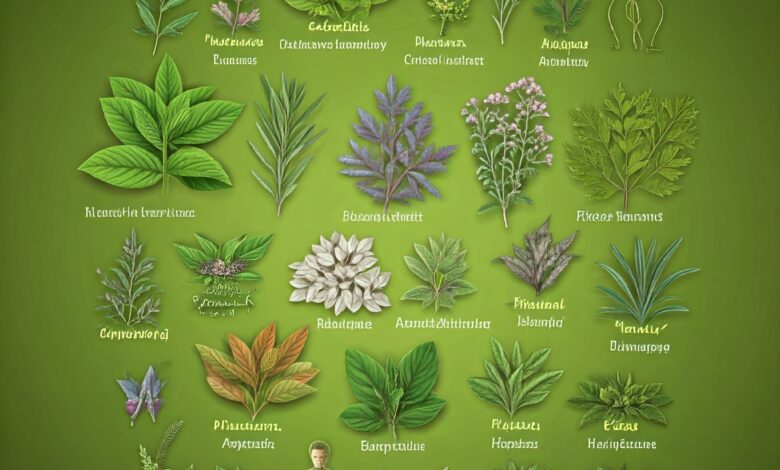Herbs for Treating Arthritis

- Understanding Epilepsy: Seizures, Diagnosis, Treatment - August 30, 2025
- Hearing Loss: Causes, Signs, Solutions Guide - August 29, 2025
- Understanding Hepatitis: Causes, Symptoms, Management - August 29, 2025
Arthritis is a chronic condition affecting the joints, leading to severe pain, inflammation, and reduced mobility. Two major forms of arthritis are osteoarthritis (OA) and rheumatoid arthritis (RA). Conventional treatments for arthritis, such as non-steroidal anti-inflammatory drugs and disease-modifying anti-rheumatic drugs, can have serious side effects. Therefore, there has been increasing interest in exploring the potential of herbal medicines as safer and more effective alternatives for arthritis management.
Mechanisms of Action of Herbal Medicines in Arthritis
The anti-arthritic mechanisms of herbs include:
- Inhibition of pro-inflammatory and pro-catabolic mediators such as cytokines (e.g., IL-1, IL-6, TNF-α), prostaglandins, leukotrienes, and matrix metalloproteinases (MMPs) (Lindler et al., 2020).
- Modulation of signaling pathways (e.g., NF-κB, RANKL, PI3K/Akt) involved in inflammation and joint degradation (Lindler et al., 2020).
- Reduction of oxidative stress and apoptosis of chondrocytes and synovial fibroblasts (Lindler et al., 2020).
- Promotion of collagen synthesis and inhibition of osteoclastogenesis, contributing to improved cartilage structure and bone remodeling (Lindler et al., 2020).

Herbal Medicines with Potential for Arthritis Treatment
Several herbal medicines have shown promise in the management of OA and RA based on clinical trials and preclinical studies:
- Boswellia spp. (Frankincense): Inhibits inflammatory mediators, reduces cartilage and bone degradation, and promotes collagen synthesis (Lindler et al., 2020).
- Curcuma spp. (Turmeric): Exhibits strong anti-inflammatory and antioxidant activities, protects against cartilage and bone damage (Lindler et al., 2020).
- Eremostachys laciniata: Inhibits the production of pro-inflammatory mediators like PGE2, leukotriene B4, nitric oxide, and reactive oxygen species (Lindler et al., 2020).
- Eucommia ulmoides: Reduces inflammation and improves joint structure and function (Lindler et al., 2020).
- Matricaria chamomilla L. (Chamomile): Possesses anti-inflammatory and pain-relieving effects (Lindler et al., 2020).
- Withania somnifera (Ashwagandha): Modulates inflammatory signaling pathways and reduces oxidative stress (Lindler et al., 2020).
- Zingiber officinale (Ginger): Inhibits the production of inflammatory mediators and improves joint function (Lindler et al., 2020).
Clinical Evidence for Herbal Medicines in Arthritis Treatment
Multiple clinical trials have demonstrated the efficacy of herbal medicines in improving symptoms, pain, and inflammation in patients with OA and RA:
- Boswellia spp., Curcuma spp., and Zingiber officinale have been shown to reduce joint pain, inflammation, and improve joint function in OA and RA patients (Lindler et al., 2020).
- Eremostachys laciniata, a traditional Iranian herb, has exhibited anti-inflammatory and pain-relieving effects in RA patients (Lindler et al., 2020).
- Combination herbal formulations, such as Curcuma-Boswellia complex and ginger-Acmella oleracea complex, have also demonstrated beneficial effects in reducing pain and improving joint function in OA and RA patients (Lindler et al., 2020).
Considerations and Future Directions
While herbal medicines have shown promise in the management of arthritis, there are still some important factors to consider:
- Safety: Some herbal medicines may have side effects, such as hepatotoxicity, gastrointestinal issues, and reproductive toxicity (Lindler et al., 2020).
- Bioavailability: The bioavailability of some herbal compounds is poor, which may limit their efficacy. Novel delivery systems, such as nanoparticles, are being explored to improve bioavailability (Lindler et al., 2020).
- Combination therapies: Herbal medicines may be used as complementary therapies to conventional treatments, potentially enhancing the anti-arthritic effects and reducing the need for pharmacological agents (Lindler et al., 2020).
Future research should focus on conducting more comprehensive clinical trials, investigating the bioactive compounds in herbs, and developing optimal formulations to improve the safety and efficacy of herbal medicines for arthritis management.
